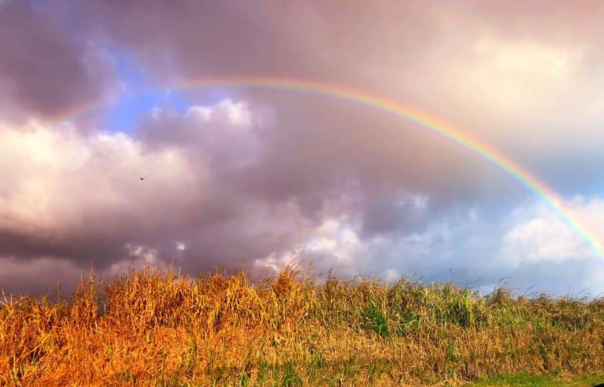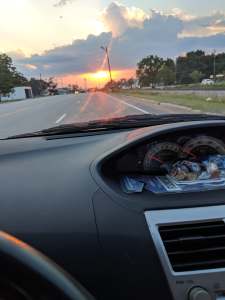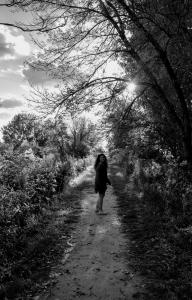 When I was younger, there wasn’t anything I hated more than blow-drying my hair, and in the hot summers of South Georgia, I saw no reason to do so before bed. This distressed my grandmother with whom I lived, who was a true saint. Each night, she would beg me to dry my hair. And when Greg and I were dating, she would still continue her bath-drawing lecture.
When I was younger, there wasn’t anything I hated more than blow-drying my hair, and in the hot summers of South Georgia, I saw no reason to do so before bed. This distressed my grandmother with whom I lived, who was a true saint. Each night, she would beg me to dry my hair. And when Greg and I were dating, she would still continue her bath-drawing lecture.
One night, Greg heard her say, “Rachel, if you blow-dry your hair, I will give you extra money for the trip.” Something about that rubbed him wrong at the time, but it didn’t bother me, and it doesn’t bother me now. She was trying to get what she wanted, a granddaughter with dry hair, and I was trying to get what I wanted–and have wanted since the age of five–away from the blow dryer.
I was fully confident in my grandmother’s love. I knew her well, I knew the sacrifices she had made for me since my birth. I had always been told that she loved me from the moment my mother told her I existed, and I know that to be true. When I was a very ill toddler, hospitalized for hydrocephalus in Egleston Children’s Hospital in Atlanta, Grandma would drive all over Atlanta hunting for Gerber Blueberry Buckle, the only food I would eat.
She loved me with that desperate love with which you love a child who might die.
I loved her equally. But Greg, who was an outsider, viewed our interactions with a different eye, and he thought that in offering me an incentive, she was actually offering me her love.
This was not the truth, but it was the truth as he saw it.
I’ve had a lot of time lately to think about the tit-for-tat economy and the conditional nature of most daily love. Everyday love. Our earthly relationships are meant to mirror Christ and the church, the Heavenly Father and His children, but what they often mirror are Walmart transactions: you give me this and I will give you that–and if you do not give me this, I might give you something, but it’s not necessarily going to be what you want or need.
We become very accustomed to these conditional reciprocal interactions, engaging in them over and over until suddenly, one day, they have lost their appeal.
Doing something just to get something seems, finally, wrong.
It may take years, but work-based worth-proving loses all of its appeal. We simply don’t care about getting anything anymore from those people. If we have to play baseball to win our parents’ love, and we start to hate baseball, we start to hate our parents. If children have to make A’s for Grandpa to be happy, when chemistry class gets really difficult, and then geometry does too, and they’re doing the best they can but have B’s, they begin to dislike school–and feel differently about Grandpa.
I don’t know what it is about us, but we get tired of the if.
We just want love.
Most of the C.S. Lewis that I have read comes from short tweets, inspirational art, and quick glances at underlinings in my grandmother’s books. but I know that one thing he says over and over is that if we yearn for something else, then something else better must exist. And I think that if we yearn for a love that is not conditional, we are in some ways proving the existence of heaven. A loving God would not create us with such a deep desire to experience true love if it were not possible. And in giving us Jesus and freeing us from the “works mentality,” He still did not erase the longing for love.
You may, after a good day–one with blue herons and sunny lakes and icy lemonade and happy children–feel awakened and relieved. For that moment, you may feel all your burdens lift. But eventually, they will settle back upon you, and your heart will once again be weighted and grayed–and you will again feel fear and tremble.
It is in this time that the promise of heavenly love is so powerful. To know that God loves us even if we leave dishes in the sink. Even if we get every orifice pierced. Despite our tattoos, despite our sin, despite the horrifically poor decisions that we made when we were fourteen or thirty-eight. In the face of all this, His love is unchanging. To live, then, with the changing love, of our parents, partners, and children, is particularly distressing.
We want heaven, but we’re here. We want full souls and spirits, but we are here.
That longing for more, those jostles in our souls that remain even after the best of earthly days, is, then, a reassurance, a heavenly reminder that if you cannot be filled here, there must be a there.
And so the feeling of emptiness, of disconnect, can become a glorious reminder that elsewhere, there is more.
In this way, emptiness becomes hope.
And because we know this, because we understand that knowing our emptiness means knowing His fullness, we can go forth. Without earthly understanding. Without earthly love. Without any single thing our soul thinks we need, we can go forth–even on the days we dread.
In our lack, there is His abundance.
Glory.
 There is something that God does for me before a crisis–when I can see the giant, dark waves coming and feel the sand beginning to wash out beneath me. He allows me, always, a brief time with friends. The quickest of rejuvenations–not weeks on a beach, not even lingering dinners–just quick reminders: You also have this.
There is something that God does for me before a crisis–when I can see the giant, dark waves coming and feel the sand beginning to wash out beneath me. He allows me, always, a brief time with friends. The quickest of rejuvenations–not weeks on a beach, not even lingering dinners–just quick reminders: You also have this.
 August 8, 2019
August 8, 2019